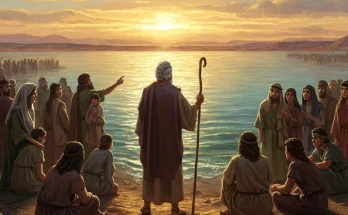Have you ever wondered why God marked Cain instead of destroying him after he murdered Abel? His story, found in Genesis 4, is both tragic and thought-provoking. As the firstborn of Adam and Eve, Cain had the unique opportunity to set an example for humanity’s future. Instead, his jealousy led him to commit the first murder recorded in Scripture, changing the course of his life forever.
Cain’s story isn’t just about wrongdoing—it reveals deep truths about sin, divine justice, and God’s mercy. Although he received a severe curse, God still protected him, marking him to prevent others from taking revenge. Why did God extend mercy to a man who had taken an innocent life?
His journey from farmer to fugitive teaches us about the dangers of unchecked anger and the consequences of rejecting God’s warnings. Yet, even in judgment, we see God’s hand at work. Cain’s wandering fate serves as a warning, but it also invites us to reflect on God’s justice and compassion. As we explore his life, let’s consider what his story means for us today. What can we learn from his choices, his punishment, and his mark?
Strengths and Accomplishments
Cain holds a unique place in history as the firstborn son of humanity. As the eldest child of Adam and Eve, he carried the responsibility of leading the next generation. Although his life took a dark turn, we can still recognize the role he played in early civilization.
Cain worked the land, becoming the first recorded farmer. While his brother Abel tended flocks, Cain cultivated crops, helping to provide food for his family. His skills in agriculture likely contributed to humanity’s survival and development. Even though his sacrifice was rejected, his labor still played a crucial role in sustaining life.
Despite his sin, God did not immediately destroy Cain. Instead, He marked him, ensuring that no one would take revenge. This mark was a sign of God’s mercy, even in the midst of judgment. Though Cain became a wanderer, he was not abandoned completely.
His life reminds us that even those who make grave mistakes are still part of God’s greater plan. Though he is often remembered for his failure, Cain’s contributions to early society remain significant. His story challenges us to consider how our choices impact both our future and God’s purpose for us.
Weaknesses and Mistakes of Cain
Cain’s story reminds us how dangerous unchecked sin can be. His first mistake was offering an unacceptable sacrifice, which revealed his wrong heart attitude. While Abel gave his best, Cain’s offering lacked true devotion. Instead of seeking to please God, he gave something that did not reflect sincere faith.
When God rejected his sacrifice, Cain allowed jealousy and anger to consume him. Rather than humbling himself and correcting his ways, he focused on his brother. This resentment led him to commit the first murder, taking Abel’s life in cold blood. But even after this tragic act, he refused to repent.
When God confronted him, Cain responded with defiance. Instead of confessing, he lied, asking, “Am I my brother’s keeper?” His hardened heart led to severe consequences. Because of his sin, he became a wanderer, separated from God’s presence. Though he feared punishment, he still showed no remorse for what he had done.
Cain’s downfall teaches us an important lesson—sin starts in the heart. If we ignore God’s warnings, it can lead to destruction. But when we humble ourselves and turn to Him, there is always a path to redemption.
Lessons from Their Life
Cain’s story teaches us that God desires true obedience, not just outward religious acts. When Cain and Abel brought their offerings, God accepted Abel’s but rejected Cain’s. The issue wasn’t just the offering itself—it was Cain’s heart. His sacrifice lacked faith and sincerity, showing us that God values genuine devotion more than ritual.
Another lesson we learn is that unchecked jealousy and anger can lead to devastating consequences. Instead of learning from his mistake, Cain allowed bitterness to take root. His jealousy toward Abel consumed him, eventually leading to murder. We, too, must guard our hearts, because envy and resentment can drive us to destructive choices.
Cain’s life also reveals that sin has lasting effects, but God still extends mercy. Though Cain faced serious consequences, God placed a mark on him to protect him from harm. This reminds us that while sin separates us from God, His mercy remains available. Even in judgment, He provides opportunities for grace.
Finally, Cain’s wandering fate warns us about the dangers of turning away from God. His rebellion led to isolation, both physically and spiritually. When we ignore God’s guidance, we risk drifting further from His presence. But if we humble ourselves and seek Him, He always welcomes us back. Cain’s story challenges us to examine our hearts and choose obedience over rebellion.
The New Strong’s Expanded Concordance
The best concordance for word study! This exclusive new edition of a legendary classic puts generations of biblical research at your fingertips.
Vital Statistics for Cain
Cain’s name means “acquired” or “possession,” reflecting Eve’s belief that he was a gift from God. As the firstborn of Adam and Eve, he held a unique place in human history. However, his story is remembered more for tragedy than triumph.
Cain worked as a farmer, laboring to cultivate the land. While his brother Abel tended flocks, Cain focused on growing crops. Though his work was valuable, his heart was not fully devoted to God. When he brought an offering, it was rejected because it lacked faith and sincerity.
One of Cain’s defining moments was his violent act against Abel. Driven by jealousy and anger, he committed the first murder. This led to a severe punishment—God cursed him and made him a wanderer. Instead of repenting, Cain complained about his punishment, showing no remorse.
Even in judgment, God placed a mark on Cain, protecting him from harm. This act of mercy ensured that no one would take vengeance on him. His life serves as both a warning and a lesson, reminding us that choices have lasting consequences. Cain’s story challenges us to examine our own hearts and seek true obedience to God.
- Name Meaning: Cain means “acquired” or “possession.”
- Family: Son of Adam and Eve, brother of Abel.
- Occupation: Farmer.
- Major Events: Offered a rejected sacrifice, killed Abel, received God’s curse, marked and exiled to wander the earth.
Final Thoughts on Cain
Cain’s life is a powerful warning about the dangers of unchecked sin. His story reminds us that jealousy, anger, and pride can lead to devastating consequences. Instead of humbling himself before God, Cain chose rebellion, which led to separation and suffering.
Yet, even in judgment, God showed mercy by marking Cain for protection. This reveals an important truth—God’s justice and grace go hand in hand. While sin separates us from Him, He still provides opportunities for redemption. If Cain had repented, his story might have ended differently.
Cain’s fate also teaches us about the importance of our hearts. God doesn’t just want our actions; He wants our devotion. His rejection of Cain’s offering wasn’t about the gift itself, but about the attitude behind it. True worship comes from faith, not obligation.
Ultimately, Cain’s life challenges us to examine our own choices. Are we harboring bitterness, or are we willing to turn back to God? His story reminds us that sin has lasting effects, but God’s mercy is always available. If we seek Him with sincerity, He is ready to forgive and restore us.
Key Verse for Cain
If you do what is right, will you not be accepted? But if you do not do what is right, sin is crouching at your door; it desires to have you, but you must master it (Genesis 4:7)
Cain’s story is told in Genesis 4:1 – 17. He is also mentioned in Hebrews 11:4; 1 John 3:12; Jude 11
Frequently Asked Questions (FAQ) About Cain
1. Why did God reject Cain’s offering but accept Abel’s? God rejected Cain’s offering because it lacked faith and sincerity. While Abel gave his best, Cain’s sacrifice did not reflect true devotion (Genesis 4:3-5). God desires obedience from the heart, not just outward religious acts.
2. What was the mark of Cain, and why did God give it to him? The Bible does not specify what the mark was, but it was a sign of God’s protection. Despite Cain’s sin, God showed mercy by ensuring no one would kill him (Genesis 4:15). The mark served as both a consequence and a safeguard.
3. What can we learn from Cain’s life today? Cain’s story teaches us that unchecked sin leads to serious consequences. His jealousy, anger, and rebellion caused his downfall. However, his story also reveals God’s justice and mercy, reminding us to seek God with a sincere heart.





